-
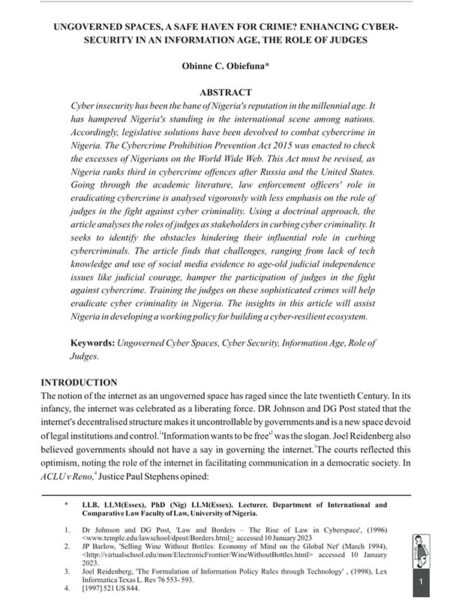
Ungoverned Spaces, a Safe Haven for Crime? Enhancing Cyber-Security in an Information Age, the Role of Judges
0₦2,500.00Dr. Obinne C. Obiefuna, in his article, Ungoverned Spaces a Safe Haven for Crime? Enhancing Cyber-Security in an Information Age, the Role of Judges, explores the problem of cyber-crime, the efficacy of extant legislation and the role of judges in effective regulation of cyber security. Cyber insecurity has been the bane of Nigeria’s reputation in the millennial age. It has hampered Nigeria’s standing in the international scene among nations. The Cybercrime Prohibition Prevention Act 2015 was enacted to check the excesses of Nigerians on the World Wide Web. This Act has been less than effective as Nigeria ranks third in cybercrime offences after Russia and United States. Going through academic literature, the role of law enforcement officers in eradication of cybercrime is analyzed vigorously with less emphasis on the role of judges in the fight against cyber criminality. Using doctrinal approach, Obiefuna analyses the roles of judges as stakeholders in curbing cyber criminality. Obiefuna seeks to identify the obstacles hindering their effective role in curbing cybercriminals. He finds that challenges, ranging from lack of tech knowledge, use of social media, evidence of the age old judicial independence issues like judicial courage hamper the participation of judges in the fight against cybercrime. Obiefuna suggested that emphasis on training the judges on these sophisticated crimes will help to eradicate cyber criminality in Nigeria.
-
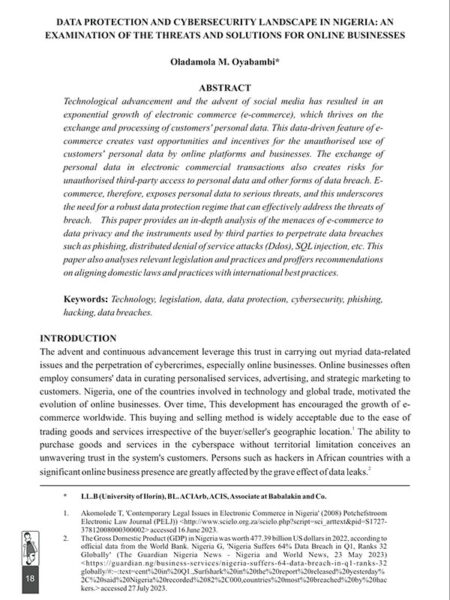
Data Protection and Cybersecurity Landscape in Nigeria: An Examination of the Threats and Solutions for Online Businesses
0₦2,500.00Oladamola M. Oyabambi, in his article, Data Protection and Cybersecurity Landscape in Nigeria: An Examination of the Threats and Solutions for Online Businesses, dwells on technological advancement and the advent of social media on the growth of electronic commerce (e-commerce), which thrives on the exchange and processing of personal data of customers. This data-driven feature of e-commerce creates vast opportunities and incentives for unauthorised use of personal data of customers by online platforms and businesses. The exchange of personal data in electronic commercial transactions also creates risks for unauthorised third-party access to personal data and other forms of data breach. E-commerce therefore exposes personal data to serious threats, and this underscores the need for a strong data protection regime that can effectively address the threats of breach. Oyabambi provides an in-depth analysis of the menaces of e-commerce to data privacy, the instruments used by third parties to perpetrate data breaches such as: phishing, distributed denial of service attacks (Ddos), SQL injection etc. He analyzes relevant legislation and practices, and proffers recommendations on how best to align domestic laws and practices with international best practice.
-
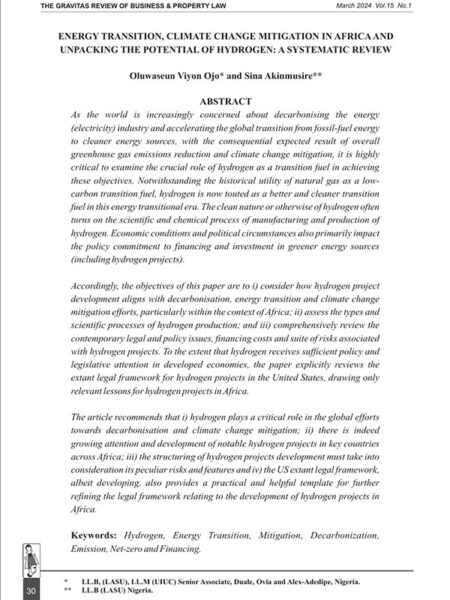
Energy Transition, Climate Change Mitigation in Africa and Unpacking the Potential of Hydrogen: A Systematic Review
0₦2,500.00Oluwaseun Viyon Ojo and Sina Akinmusire, in their article, Energy Transition, Climate Change Mitigation in Africa and Unpacking the Potential of Hydrogen: A Systematic Review, address increasing concerns about decarbonizing the energy (electricity) industry and accelerating the global transition from fossil-fuel energy to cleaner energy sources. With the consequential expected result of overall greenhouse gas emissions reduction and climate change mitigation, it is extremely critical to examine the crucial role of hydrogen as a transition fuel in achieving these objectives. Notwithstanding the historical utility of natural gas as a low-carbon transition fuel, hydrogen is now touted as a better and cleaner transition fuel in this energy transitional era. The clean nature or otherwise of hydrogen often turn on the scientific and chemical process of manufacturing and production of hydrogen. Crucially, economic conditions and political circumstances also largely impact the policy commitment to financing and investment in greener energy sources (including hydrogen projects). Ojo and Akinmusire address a number of cognate issues. They consider how hydrogen project development aligns with decarbonization, energy transition and to the extent that hydrogen is currently receiving sufficient policy and legislative attention in developed economies, the paper specifically reviews the extant legal framework for hydrogen projects in the United States, drawing only relevant lessons for hydrogen projects in Africa..
-
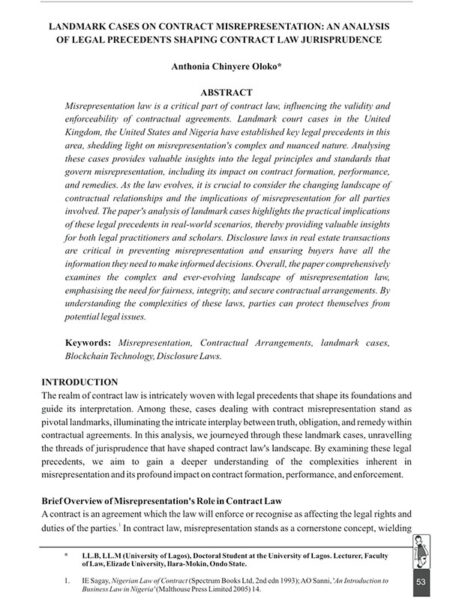
Landmark Cases on Contract Misrepresentation: An Analysis of Legal Precedents Shaping Contract Law Jurisprudence
0₦2,500.00Anthonia Chinyere Oloko, in her article, Landmark Cases on Contract Misrepresentation: An Analysis of Legal Precedents Shaping Contract Law Jurisprudence, visits the law on misrepresentation as a critical part of contract law, influencing the validity and enforceability of contractual agreements. Landmark court cases in the United Kingdom, the United States and Nigeria have established key legal precedents in this area, shedding light on the complex and nuanced nature of misrepresentation. Analysing these cases provides valuable insights into the legal principles and standards that govern misrepresentation, including its impact on contract formation, performance, and remedies. As the law evolves, it is important to consider the changing landscape of contractual relationships and the implications of misrepresentation for all parties involved. The paper’s analysis of landmark cases highlights the practical implications of these legal precedents in real-world scenarios, thereby providing valuable insights for both legal practitioners and scholars. Disclosure laws in the realm of real estate transactions are critical in preventing misrepresentation and ensuring that buyers have all the information they need to make informed decisions. Oloko provides a comprehensive examination of the complex and ever-evolving landscape of misrepresentation law, emphasising the need for fairness, integrity, and secure contractual arrangements. By understanding the complexities of these laws, parties can protect themselves from potential legal issues.
-
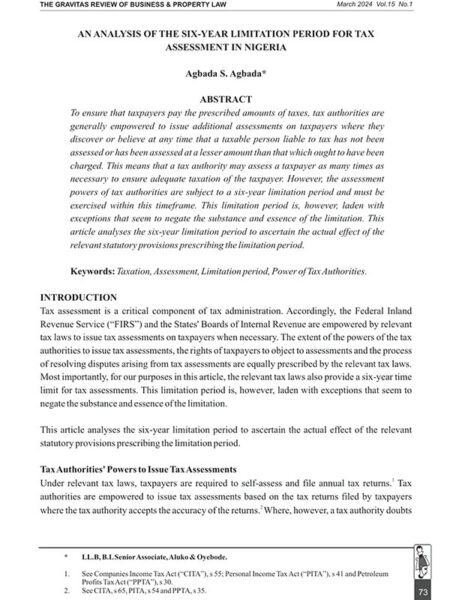
An Analysis of the Six-year Limitation Period for Tax Assessment in Nigeria
0₦2,500.00Agbada S. Agbada, in his article, An Analysis of the Six-year Limitation Period for Tax Assessment in Nigeria, examines the six-year limitation period for tax assessment in Nigeria. To ensure that the prescribed amounts of taxes are paid by taxpayers, tax authorities are generally empowered to issue additional assessments on taxpayers where they discover or are of the opinion at any time that a taxable person liable to tax has not been assessed or has been assessed at a lesser amount than that which ought to have been charged. This means that a tax authority may assess a taxpayer for as many times as may be necessary to ensure an adequate taxation of the taxpayer. However, the assessment powers of tax authorities are subject to a six-year limitation period and are required to be exercised within this timeframe. This limitation period is however laden with exceptions that seem to negate the substance and essence of the limitation. Agbada analyses the six-year limitation period with a view to ascertaining the true effect of the relevant statutory provisions prescribing the limitation period.
-
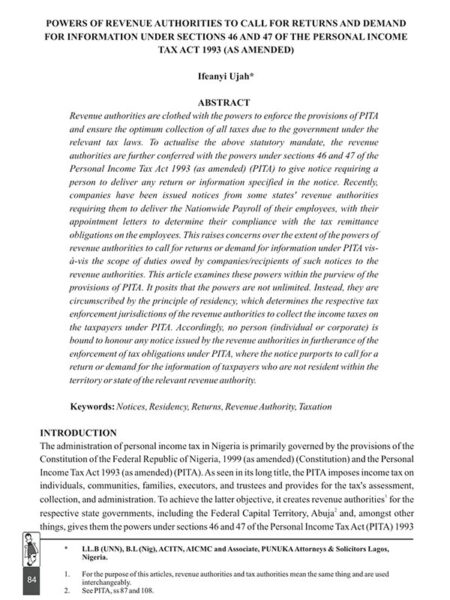
Powers of Revenue Authorities to Call for Returns and Demand for Information under Sections 46 and 47 of the Personal Income Tax Act 1993
0₦2,500.00Ifeanyi Ujah, in his article, Powers of Revenue Authorities to Call for Returns and Demand for Information under Sections 46 and 47 of the Personal Income Tax Act 1993, examines the extent and limitations on the powers of Revenue authorities to call for Returns and Demand for Information under the PITA. Revenue authorities are clothed with the powers to enforce the provisions of PITA and ensure optimum collection of all taxes due to the government under the relevant tax laws. To actualize the above statutory mandate, the revenue authorities are further conferred with the powers under sections 46 and 47 of the Personal Income Tax Act 1993 (as amended) (PITA) to give notice requiring a person to deliver any return or information specified in the notice. Recently, companies have been issued with notices from revenue authority of some states, requiring them to deliver the Nationwide Payroll of their employees, with their appointment letters for the purpose of determining their compliance with the tax remittance obligations on the employees. This raises concerns over the extent of the powers of revenue authorities to call for returns or demand for information under PITA, vis-à-vis the scope of duties owed by companies/recipients of such notices to the revenue authorities. Ujah examines these powers within the purview of the provisions of PITA. He posits that the powers are not unlimited, rather they are circumscribed by the principle of residency which determines the respective tax enforcement jurisdictions of the revenue authorities to collect the income taxes on the taxpayers under PITA. Accordingly, no person (individual or corporate) is bound to honour any notice issued by the revenue authorities in furtherance to the enforcement of tax obligations under PITA, where the notice purports to call for return or demand for the information of taxpayers who are not resident within the territory or state of the relevant revenue authority.
-
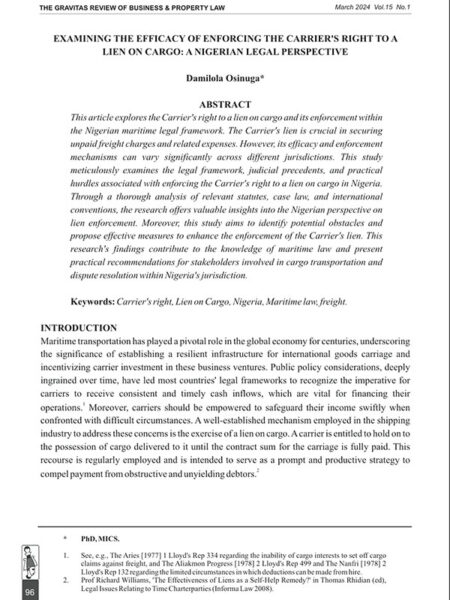
Examining the Efficacy of Enforcing the Carrier’s Right to a Lien on Cargo: A Nigerian Legal Perspective
0₦2,500.00Dr. Damilola Osinuga, in his article, Examining the Efficacy of Enforcing the Carrier’s Right to a Lien on Cargo: A Nigerian Legal Perspective, provides an in-depth exploration of the carrier’s right to a lien on cargo and its enforcement within the Nigerian maritime legal framework. The carrier’s lien plays a crucial role in securing unpaid freight charges and related expenses. However, its efficacy and enforcement mechanisms can vary significantly across different jurisdictions. Osinuga meticulously examines the legal framework, judicial precedents, and practical hurdles associated with enforcing the carrier’s right to a lien on cargo in Nigeria. Through a thorough analysis of relevant statutes, case law, and international conventions, the research offers valuable insights into the Nigerian perspective on lien enforcement. Osinuga aims to identify potential obstacles and propose effective measures to enhance the enforcement of the carrier’s lien.
-
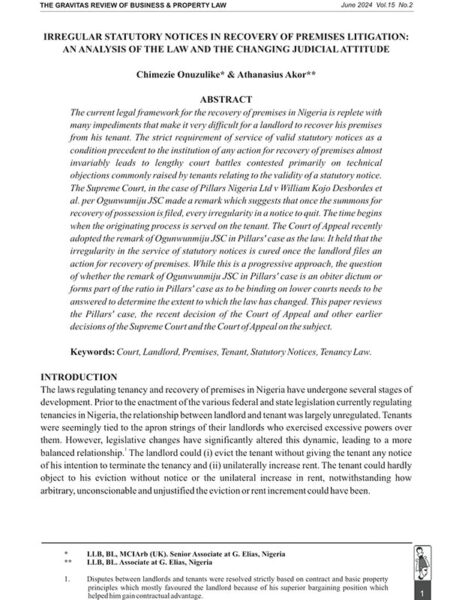
Irregular Statutory Notices in Recovery of Premises Litigation: An Analysis of the Law and the Changing Judicial Attitude
0₦2,500.00In their article, Irregular Statutory Notices in Recovery of Premises Litigation: An Analysis of the Law and the Changing Judicial Attitude, Chimizie Onuzulike and Athanasius Akor, bring to our attention the recent developments in the law and practice on recovery of tenanted premises. The current legal framework on recovery of premises in Nigeria is replete with very many impediments that make it very difficult for a landlord to recover his premises from his tenant. The strict requirement of service of valid statutory notices as condition precedent to the institution of any action for recovery of premises almost invariably, lead to lengthy court battles contested primarily on technical objections commonly raised by tenants relating to validity of a statutory notice. The Supreme Court, in the case of Pillars Nigeria Ltd v. William Kojo Desbordes et al. per Ogunwumiju JSC recently made a remark which seems to suggest that once the summons for recovery of possession is filed, every irregularity in a notice to quit is cured and the time begins to run from the date the originating process is served on the tenant. The Court of Appeal recently adopted the remark of Ogunwunmiju JSC in Pillars’ case as the law and held that the irregularity in the service of statutory notices is cured once an action for recovery of premises is filed by the landlord. While this is a progressive approach, the question whether the remark of Ogunwunmiju JSC in Pillars’ case is an obiter dictum or forms part of the ratio in Pillars’ case as to be binding on lower courts needs to be answered to determine the extent to which the law has changed. Onuzulike and Akor review the Pillars’ case, the recent decision of the Court of Appeal and other earlier decisions of the Supreme Court and the Court of Appeal on the subject.
-
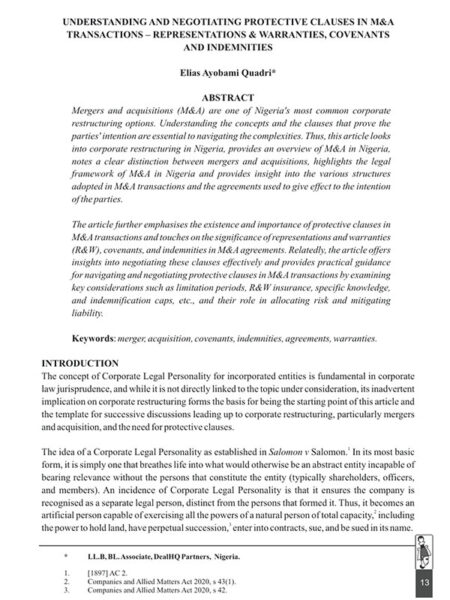
Understanding and Negotiating Protective Clauses in M&A Transactions – Representations & Warranties, Covenants & Indemnities
0₦2,500.00Elias Ayobami Quadri, in his article, Understanding and Negotiating Protective Clauses in M&A Transactions – Representations & Warranties, Covenants and Indemnities, discusses the legal effect of representation, warranties, covenants and indemnities in merger and acquisition transactions. In corporate restructurings, a clear understanding of the concepts and the clauses that evidence the intention of the parties are essential to navigating the complexities present therein. Elias looks into corporate restructuring in Nigeria, provides an overview of M&A in Nigeria, noting a clear distinction between mergers and acquisition, highlighting the legal framework of M&A in Nigeria, and providing insight into the various structures adopted in M&A transactions and the agreements used to give effect to the intention of the parties. Elias further emphasizes the existence and importance of protective clauses in M&A transactions and touches on the significance of representations and warranties (R&W), covenants, and indemnities in M&A agreements. Relatedly, Elias offers insights into negotiating these clauses effectively, and provides practical guidance for navigating and negotiating protective clauses in M&A transactions by examining key considerations such as limitation periods, R&W insurance, specific knowledge, and indemnification caps, etc., and its role in allocating risk and mitigating liability.
-
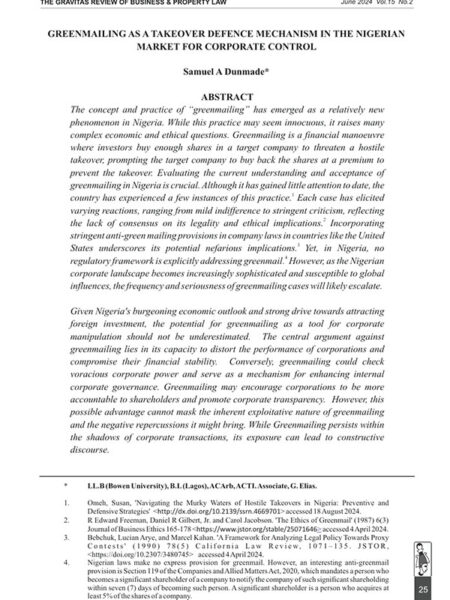
Greenmailing as a Takeover Defence Mechanism in the Nigerian Market for Corporate Control
0₦2,500.00Samuel A. Dunmade, in his article, Greenmailing as a Takeover Defence Mechanism in the Nigerian Market for Corporate Control, examines the concept and practice of “greenmailing” as a relatively new phenomenon in Nigeria. Put simply, greenmailing is a financial manoeuvre where investors buy enough shares in a target company to threaten a hostile takeover thereby prompting the target company to buy back the shares at a premium to prevent the takeover. Whilst this practice may seem innocuous on its surface, it raises a host of complex economic and ethical questions. It is crucial to evaluate the current understanding and acceptance of greenmailing in Nigeria. Although it has gained little attention to date, the country has experienced a few instances of this practice. Each case has elicited varying reactions, ranging from mild indifference to stringent criticism, a reflection of the lack of consensus on its legality and ethical implications. The incorporation of stringent anti-green mailing provisions in company laws in countries like the United States underscores its potential nefarious implications. Yet, in Nigeria, no regulatory framework is explicitly addressing greenmail. However, as the Nigerian corporate landscape becomes increasingly sophisticated and susceptible to global influences, the frequency and seriousness of greenmailing cases will likely escalate.
-
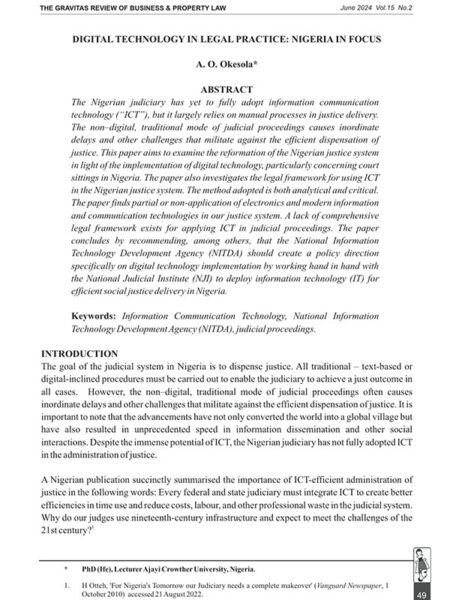
Digital Technology in Legal Practice: Nigeria in Focus
0₦2,500.00Dr. A.O. Okesola, in his article, Digital Technology in Legal Practice: Nigeria in Focus, examines the reformation of the Nigeria justice system in the light of the implementation of digital technology, particularly as it pertains to court sittings in Nigeria. Okesola also investigates the legal framework for the use of ICT in the Nigeria justice system. The method adopted is both analytical and critical. Okesola finds that there is partial or non – application of electronics and modern information and communication technologies in our justice system. There is also non – existing comprehensive legal framework for the application of ICT in judicial proceedings. Okesola concludes by recommending among others that the National Information Technology Development Agency (NITDA) should create a policy direction specifically on digital technology implementation by working hand in hand with the National Judicial Institute (NJI) to deploy information technology (IT) for efficient social justice delivery in Nigeria.
-
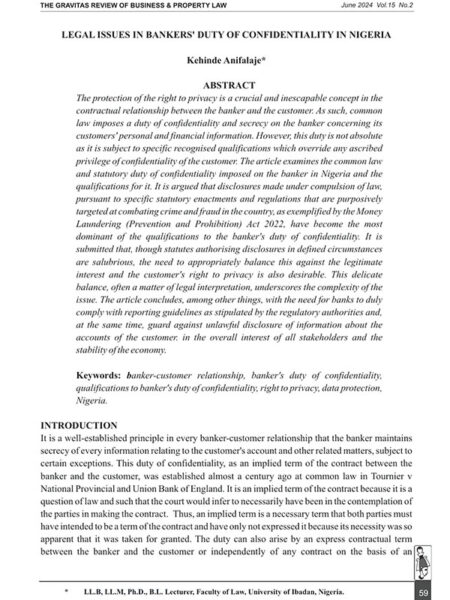
Legal Issues in Bankers’ Duty of Confidentiality in Nigeria
0₦2,500.00Dr. Kehinde Anifalaje, in his article, Legal Issues in Bankers’ Duty of Confidentiality in Nigeria, examines the common law and statutory duty of confidentiality imposed on the banker in Nigeria and the qualifications thereto. It is argued that disclosures made under compulsion of law, pursuant to specific statutory enactments and regulations that are purposively targeted at combating crime and fraud in the country, as exemplified by the Money Laundering (Prevention and Prohibition) Act 2022, have become the most dominant of the qualifications to the banker’s duty of confidentiality. Anifalaje submits that, though statutes authorising disclosures in defined circumstances are salubrious, the need to appropriately balance this against the legitimate interest and the right to privacy of the customer is also desirable. Anifalaje concludes, inter alia, with the need for banks to duly comply with reporting guidelines as stipulated by the regulatory authorities and at the same time guard against unlawful disclosure of information pertaining to the accounts of the customer in the overall interest of all stakeholders and the stability of the economy.
The Gravitas Review of Business & Property Law



